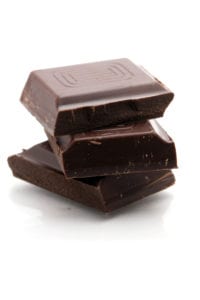Written by Jessica Patella, ND. Study participants who consumed ten grams of dark chocolate had a significant reduction in systolic blood pressure and heart rate compared to the control group who ate white chocolate.
 Heart disease is the leading cause of death for both men and women in the United States1. The three major risk factors for heart disease are high blood pressure, high cholesterol and smoking, and an estimated 47% of Americans have at least one of these risk factors1. Recent research shows that a single piece of dark chocolate can significantly reduce systolic blood pressure and heart rate, which could therefore increase life expectancy because of reduction in cardiovascular disease risk factors2 (1).
Heart disease is the leading cause of death for both men and women in the United States1. The three major risk factors for heart disease are high blood pressure, high cholesterol and smoking, and an estimated 47% of Americans have at least one of these risk factors1. Recent research shows that a single piece of dark chocolate can significantly reduce systolic blood pressure and heart rate, which could therefore increase life expectancy because of reduction in cardiovascular disease risk factors2 (1).
Dark chocolate is rich in polyphenols, which have been shown to reduce the risk of disease and morbidity2,3. Dark chocolate is also an antioxidant4, anti-inflammatory5, anti-atherosclerotic6, and has been shown to improve nitric oxide bioavailability7, which increases the diameter of blood vessels and therefore lowers blood pressure2. Thus, chocolate consumption is simple and easy to do, yet has potential impact on improving cardiovascular health.
The first study to describe the effect of a single dose of dark chocolate included 31-healthy subjects (18-25 yrs old) that were divided into two groups; the dark chocolate group (n=21) and the white chocolate group (n=10)2. The chocolates had the following nutritional profiles:
- Dark Chocolate: 10 grams, Kcal=54.4, carbohydrates=4g, fats=3.6g, proteins=0.8g, sodium=0 mg, fiber=0.8g, total flavonoids=5.41mg
- White Chocolate: 7 grams, Kcal=38.08, carbohydrates=4.2g, fats=2.1g, proteins=0.5g, sodium=12.32mg, fiber=0g, total flavonoids=0mg
Participants in the study arrived at the study center after abstaining from caffeine for 24 hours and resting blood pressure (BP) and heart rate (HR) were measured. The subjects then consumed the chocolate and BP and HR were measured immediately after. Measurements were also repeated 1-hour after the chocolate consumption2.Dark chocolate consumption significantly reduced systolic blood pressure and heart rate. The results were as follows:
| Dark Chocolate | Before | After | Significance |
|---|---|---|---|
| Systolic Blood Pressure (mmHg) | 106 +/- 9 | 102 +/- 10 | p<0.05 |
| Heart rate (bpm) | 78 +/- 8 | 74 +/- 8 | p<0.05 |
In conclusion, a single dose of dark chocolate improved systolic blood pressure and heart rate in healthy participants. Researchers feel it is reasonable to believe dark chocolate is a valuable option that might promote health and reduce cardiovascular risk and mortality2. Future randomized trials with more participants need to be performed to confirm results and to determine the mechanism of action.
Source: DUARTE, Ana Amélia Machado, Cristiano Mostarda, Maria Claudia Irigoyen, and Katya Rigatto. “A single dose of dark chocolate increases parasympathetic modulation and heart rate variability in healthy subjects.” Revista de Nutrição 29, no. 6 (2016): 765-773.
All content of this journal, except where identified, is licensed under an Open Access Creative Commons attribution-type BY.
Click here to read the full text study.
Posted July 31, 2018.
References:
- Centers for Disease Control and Prevention. 2018; https://www.cdc.gov/heartdisease/facts.htm. Accessed 7/25/2018, 2018.
- DUARTE AAM, Mostarda C, Irigoyen MC, Rigatto K. A single dose of dark chocolate increases parasympathetic modulation and heart rate variability in healthy subjects. Revista de Nutrição. 2016;29(6):765-773.
- Manach C, Mazur A, Scalbert A. Polyphenols and prevention of cardiovascular diseases. Current opinion in lipidology. 2005;16(1):77-84.
- Serafini M, Bugianesi R, Maiani G, Valtuena S, De Santis S, Crozier A. Plasma antioxidants from chocolate. Nature. 2003;424(6952):1013.
- Selmi C, Cocchi CA, Lanfredini M, Keen CL, Gershwin ME. Chocolate at heart: The anti‐inflammatory impact of cocoa flavanols. Molecular nutrition & food research. 2008;52(11):1340-1348.
- Baba S, Natsume M, Yasuda A, et al. Plasma LDL and HDL cholesterol and oxidized LDL concentrations are altered in normo-and hypercholesterolemic humans after intake of different levels of cocoa powder. The Journal of nutrition. 2007;137(6):1436-1441.
- Taubert D, Roesen R, Lehmann C, Jung N, Schömig E. Effects of low habitual cocoa intake on blood pressure and bioactive nitric oxide: a randomized controlled trial. Jama. 2007;298(1):49-60.

